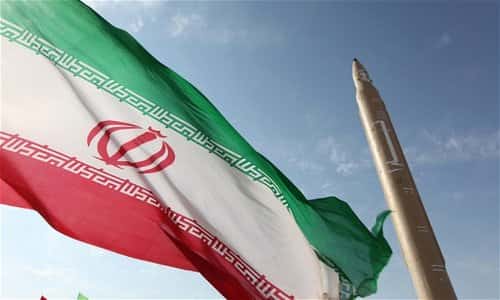So What Was Iran's Missile Strike In Syria Really About?
 By Ariel Ben Solomon/JNS.org June 30, 2017
Share this article:
By Ariel Ben Solomon/JNS.org June 30, 2017
Share this article:
While Iran routinely threatens Israel (such as the recent
revelation by satellite photos that Iran targeted a Star of David in a
ballistic missile test) and its Lebanese terror proxy, Hezbollah, has a
vast arsenal of rockets pointed at the Jewish state, experts say the
Islamic Republic was sending messages elsewhere through its first
missile strike on another country in three decades.
Iran
struck Islamic State targets in Syria on June 18, in retaliation for
Islamic State's twin terror attacks against prominent Iranian
institutions June 7. Iran had not launched a missile strike on another
nation since the Iran-Iraq War in the 1980s.
Situated
nearly 1,800 kilometers (1,118 miles) away from Israel, Iran reportedly
has missiles capable of reaching the Jewish state.
The
precision-guided Zolfaghar missiles Iran fired Sunday into the Syrian
city of Deir ez-Zor have a range of about 750 kilometers (466 miles).
Iran proceeded to showcase Zolfaghar missiles Friday during anti-Israel
"Al-Quds Day" rallies.
The Israeli government has ongoing concerns about Iran's
nuclear program, ballistic missile program and state sponsorship of
terrorism, but the Iranian missile strike in Syria seemingly had little
to do with the Jewish state.
Dr. Raz Zimmt, an
Iran expert at two Israeli think tanks, the Institute for National
Security Studies (INSS) and the Forum for Regional Thinking, told
JNS.org Iran's missile attack was "a direct response to the [June 7]
terror attack in Tehran and a message both for domestic, regional and
international use."
Zimmt explained that,
internationally, Iran "wanted to send a message that it considers its
missile capabilities to be vital to its national interests, especially
in light of the growing U.S. criticism against this capability." The
U.S. Senate passed new sanctions against Iran's ballistic missile
program June 15.
"The Iranian regime wanted to
send a message to its rivals, especially the Saudis, and to a lesser
extent, in my view, Israel, showing its strength as a regional power,"
Zimmt said.
Missile Accuracy 'the Lesser Issue'
IDF
Chief of Staff Lt. Gen. Gadi Eizenkot said the Iranian missile launch
was "smaller" than what was reported and achieved "far from precise
hits."
Yet accuracy "is the lesser issue,"
said Dr. Eado Hecht, a military expert at Bar-Ilan University's
Begin-Sadat Center for Strategic Studies.
"If
[the Iranians] launch towards targets in an Israeli city, then it really
does not matter on which street the missile falls--their capability of
hitting a target area the size of Haifa or Tel Aviv is a given," Hecht
told JNS.org.
Hecht said the strike in Syria demonstrated Iran's ability to reach a target area as far as 700 kilometers (435 miles) away.
That
does not prove Iran can strike Israel with its missiles, but the regime
is assumed to have such a capability, according to Hecht, who added
that it is difficult for the Jewish state to gather information on
Iranian missiles solely from test-launches.
Overall, Iran's "message is more to others rather than to Israel" through the strike on Syria, said Hecht.
"I think demonstrating this capability and the willingness to use it was directed more to the Saudis than to Israel," he said.
Iran Showcases Its Strength
INSS
analyst Zimmt said he sees the recent escalation between the Shi'a
power of Iran and the Sunni power of Saudi Arabia as contributing to
Iran's efforts to showcase its strength.
"Iran
considers current developments in the region as an expression of a
combined effort by the Saudi-American-Zionist alliance to curb its
influence in the region, while it continues its own efforts to expand
its influence," he said.
Iran's Islamic
Revolutionary Guard Corps (IRGC) military force has come under criticism
domestically following the Islamic State terror attacks in Tehran, "so
it had to react," said Zimmt.
"The bottom
line," he said, "is that Iran always tries to turn a challenge or
weakness, such as the terror attack, into an opportunity to show its
strength."
Originally published at JNS.org - reposted with permission.

No comments:
Post a Comment